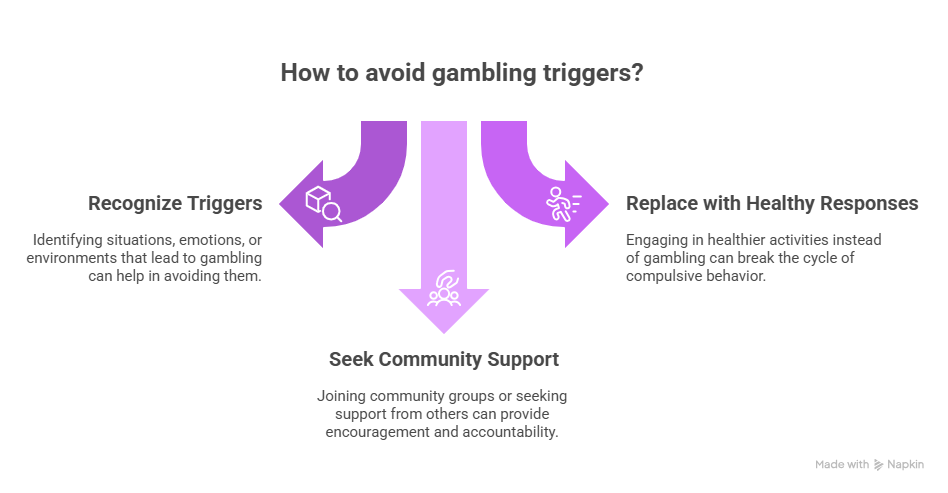To stop gambling addiction, it is crucial first to acknowledge the problem honestly and accept its impact on your life. Gambling addiction involves compulsive gambling behavior marked by cravings, financial harm, and social difficulties. Recognizing this addiction is the foundation for recovery.
The key steps to overcoming gambling addiction include:
- Acknowledge and accept the gambling problem
- Identify and avoid triggers
- Seek professional help
- Join support groups
- Create and implement financial controls
Recognizing the need for treatment involves noticing overwhelming urges, emotional distress, relationship strains, and reliance on financial help due to gambling losses. Effective treatment involves cognitive behavioral therapy (CBT) and support from healthcare providers or peer groups.
Identifying triggers such as stress, boredom, social influences, or certain environments is crucial, and replacing gambling with healthier alternatives like exercise, meditation, learning new skills, journaling, and exploring new experiences helps reduce urges and improves well-being. Recovery requires ongoing commitment, self-awareness, and a supportive community to reclaim control and build a balanced life.
Acknowledge and Accept the Gambling Problem
Accepting the addiction means honestly recognising harmful gambling behaviour and its negative impact without denial or excuses. This mental shift is essential for genuine recovery as it opens the door to receiving help and committing to change.
Identify and Avoid Triggers
Recognise situations, emotions, or environments that compel gambling and deliberately avoid them. This helps break the cycle of compulsive behaviour and reduces temptation by replacing gambling with healthier responses.
A community-based study in Goa with 1514 adult men found 45.4% reported gambling in the past year, with lotteries being the most frequent gambling type. Current and lifetime gambling were associated with work-related problems, interpersonal violence, tobacco use, and alcohol use disorder, according to Bhatia, U., et al’s 2019 study titled, “The Prevalence, Patterns, and Correlates of Gambling Behaviours in Men” published in the Asian Journal of Psychiatry.

Seek Professional Help
Contact therapists or addiction specialists who provide structured therapy to address underlying causes and build healthier coping mechanisms. Professional guidance increases accountability and supports long-term recovery.
Join Support Groups
Participate in communities like Gamblers Anonymous, where sharing experiences and encouragement offer emotional support and accountability. Group belonging has been shown to reduce urges by fostering connection.
Create and Implement Financial Control
Restrict access to money and gambling funds by budgeting, limiting access to accounts, or involving trusted persons in money management. This reduces opportunities to gamble and prevents further financial harm.
To stop gambling addiction is to reclaim control over decisions and life by combining self-awareness, professional support, behavioural changes, and continuous commitment.
What Healthy Alternatives and Coping Mechanisms Can Replace Gambling?
The healthy alternatives and coping mechanisms that can replace gambling are physical activity, learning something new, having new experiences, meditation, and journaling. Each of these provides a positive way to address the urge to gamble while promoting well-being and engagement.
Here are healthy alternatives and coping mechanisms that can replace gambling.
- Physical Activity: Engaging in exercise releases endorphins that improve mood and reduce stress, offering a healthy and natural way to feel good without gambling. Activities like sports, gym workouts, or hiking provide goals and excitement that can replace gambling thrills.
- Learn Something New: Stimulating the mind by mastering a new skill or subject keeps boredom away and diverts attention from gambling urges. This mental engagement fosters a sense of achievement and personal growth.
- Have New Experiences: Trying new things, such as travelling, exploring new places, or socialising, breaks the monotony that gambling may fill. New experiences make life feel richer and lessen the appeal of gambling as a source of excitement.
- Meditate: Meditation helps reduce stress and anxiety by calming the mind and centring thoughts, making it easier to resist compulsive urges. Regular practice builds emotional resilience and mindfulness.
- Journal: Writing down feelings when the urge to gamble arises helps process emotions thoughtfully and gain insight into triggers. Journaling acts as a therapeutic outlet and can lessen the power of impulsive gambling behaviour.
How to Recognise the Need for Gambling Addiction Treatment?
To recognise the need for gambling addiction treatment, start by observing if gambling is taking over your life and causing significant problems such as financial difficulties, strained relationships, or emotional distress. If you find yourself feeling an overwhelming urge to gamble despite adverse consequences, often thinking about gambling, needing to take increasing risks, or using gambling to escape problems, these are strong indicators.
It is also essential to notice if you experience guilt or remorse after gambling, have failed past attempts to stop, or depend on financial help to continue gambling. Consulting a healthcare provider or mental health professional for evaluation and diagnosis based on your gambling habits and behavioural patterns can confirm the need for treatment. Treatment usually involves therapy, most commonly cognitive behavioural therapy (CBT), which helps change harmful thoughts and behaviours linked to gambling. Relapses may happen, but with support and the right approach, recovery is achievable.
Where Can You Find Gambling Addiction Support and Resources?
You can find gambling addiction support and resources from healthcare providers and mental health professionals. Organisations provide treatment options such as individual therapy, group therapy, family therapy, and support groups like Gamblers Anonymous.
There are also inpatient or residential programs for severe cases and treatment for associated mental health conditions like anxiety or depression. Online resources and structured internet-based programs are available as well. Peer support resources and counselling services help with coping strategies, relapse prevention, and managing triggers to gambling. Your healthcare provider can direct you to these resources and help tailor a recovery program that fits your personal needs.
How to identify and avoid triggers that lead to gambling?
To identify and avoid triggers that lead to gambling, consider first becoming self-aware of the personal situations, emotions, and environments that prompt the urge to gamble. This involves reflecting on your gambling history and noting when and where these urges arise, which are tracked through journaling. Common triggers include emotional states like stress, boredom, or sadness, social pressures such as friends or work betting groups, specific places like casinos or sports bars, money-related stressors such as payday or unexpected bills, and time patterns including weekends or significant sports events.
Once identified, develop strategies to avoid these triggers by setting financial limits, using website blockers, replacing gambling with healthier alternatives like exercise or hobbies, and seeking support from therapists or support groups. Prioritising self-care and maintaining long-term commitment to these practices can help control urges and prevent relapse.





